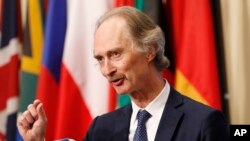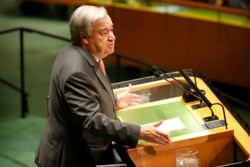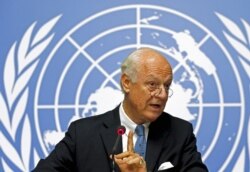The U.N. envoy for Syria said Monday that the launching of an inclusive committee to establish a new constitution should be "a sign of hope" for the war-torn country.
"This is the first concrete political agreement between the government and the opposition to begin to implement a key aspect of Security Council Resolution 2254," U.N. envoy Geir Pedersen told council members. That resolution was unanimously adopted nearly four years ago and aimed to lay out a road map to end the civil war and guide the country to elections.
On Sept. 23, U.N. Secretary-General António Guterres announced that the Syrian government of Bashar al-Assad and the Syrian Negotiations Commission had reached agreement on the composition of a constitutional committee which will be facilitated by the United Nations.
Pedersen said Monday that the committee will meet for the first time Oct. 30 in Geneva.
"I am fully aware that the constitutional committee alone cannot resolve the conflict," the envoy said of the now eight-and-half-year-old war. "This can be a door opener to a wider political process that meets the legitimate aspirations of the Syrian people."
The composition of the committee took nearly two years under Pedersen and his predecessor Staffan de Mistura to form, as the parties rejected many of the proposed names.
The final committee is composed of 50 individuals each from the government, the opposition and civil society who will discuss and adopt constitutional proposals.
The United Nations helped draw up the civil society list, which includes people from a range of political, religious, ethnic and geographic backgrounds.
"Facilitating agreement on this list has been the most complex part of the deal," Pedersen said. He said the U.N. sought to make it credible, balanced and inclusive.
'Long, difficult' road ahead
Ongoing military operations, especially in the northwestern part of Syria, still pose a threat to the political process.
"Steps on de-escalation toward a nationwide cease-fire are absolutely essential," the envoy said.
Ultimately, the goal is free and fair elections held under U.N. supervision. Pedersen said preparing elections that meet international standards takes a long time, and he has already begun to consider how to plan for such an event.
"The road ahead will be long and difficult," Pedersen warned. "But if the council can unite and keep united behind the Syrian-led-and-owned process that the United Nations will seek to facilitate, I believe we can begin to make a real difference for the people of Syria."










